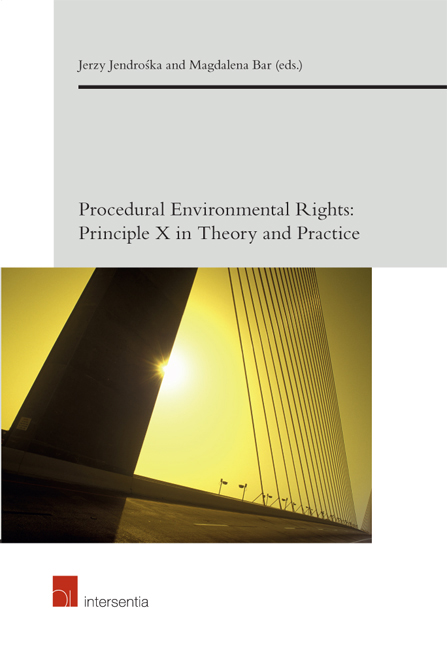Book contents
- Frontmatter
- Contents
- Introduction Procedural Environmental Rights in Theory and Practice
- Procedural Environmental Rights: Status and Developments
- Developing Standards for Procedural Environmental Rights through Practice – The Changing Character of Rio Principle 10
- The Evolution of Participatory Rights in the Era of Fiscal Austerity and Reduced Administrative Burden
- Definitions of the Aarhus Convention v the Proposal for a New Latin America and the Caribbean Instrument – Mapping the Differences in the Material Scope of Procedural Environmental Rights in International Law
- Procedural Environmental Rights in Practice
- Public Participation
- Access to Justice
- Procedural Environmental Rights and Nature Protection
- Procedural Environmental Rights and EIA
- Procedural Environmental Rights and Climate Change
The Evolution of Participatory Rights in the Era of Fiscal Austerity and Reduced Administrative Burden
from Procedural Environmental Rights: Status and Developments
Published online by Cambridge University Press: 12 October 2018
- Frontmatter
- Contents
- Introduction Procedural Environmental Rights in Theory and Practice
- Procedural Environmental Rights: Status and Developments
- Developing Standards for Procedural Environmental Rights through Practice – The Changing Character of Rio Principle 10
- The Evolution of Participatory Rights in the Era of Fiscal Austerity and Reduced Administrative Burden
- Definitions of the Aarhus Convention v the Proposal for a New Latin America and the Caribbean Instrument – Mapping the Differences in the Material Scope of Procedural Environmental Rights in International Law
- Procedural Environmental Rights in Practice
- Public Participation
- Access to Justice
- Procedural Environmental Rights and Nature Protection
- Procedural Environmental Rights and EIA
- Procedural Environmental Rights and Climate Change
Summary
INTRODUCTION
Recent decades have seen a robust improvement in participatory rights in environmental decision-making in Europe. While participatory rights, transparency and accountability have increased in national law since the Stockholm Conference in 1972, it was not until the Rio de Janeiro Summit in 1992 that a similar development started internationally. Prior to Rio, organising participation was considered a matter of national sovereignty and hence there were only few references to these rights in environmental treaties. Principle 10 of the Rio Declaration defines basic categories of participatory rights, namely, access to information, the right to participate and access to justice, which have dominated the debate ever since. Furthermore, the Rio Declaration pointed out the importance of enhancing participation for women (Principle 20) and indigenous people (Principle 22). Recently, human rights and environmental participatory rights have evolved together. For Europe the adoption of the Aarhus Convention was crucial, whereas the EU has taken even somewhat more developed steps in its own implementation of the Convention. As a result of this development and long national traditions in administrative law, the law on participatory rights is quite well developed in many European countries, one example being Finland. Current national law in Finland provides for all basic categories of participatory rights, with a number of features that exceed the level set in international and European law.
Fiscal austerity is a policy widely used in Europe, not without the influence of the European Union. Fiscal austerity aims to reduce public spending through structural changes. In the eyes of those implementing the policy, environmental issues are not an exception. Cutting administrative burden – a key tool to achieve the goals of better regulation policy – aims to improve the competiveness of regulated industries. This is based on the assumption that excessive and rigid regulation causes unnecessary costs – administrative burden – for regulated industries, which reduces competitiveness in relation to foreign competitors that manage to avoid such costs. Administrative burden is strongly affected by the procedural requirements of regulation.
In political rhetoric, participatory rights tend to be promoted, not discouraged. Most politicians keep claiming that changes in regulation will affect neither the level of environmental protection nor opportunities for the public to participate. Simultaneously, interest groups and some politicians frequently present critical arguments against public participation.
- Type
- Chapter
- Information
- Procedural Environmental RightsPrinciple X in Theory and Practice, pp. 19 - 38Publisher: IntersentiaPrint publication year: 2018



